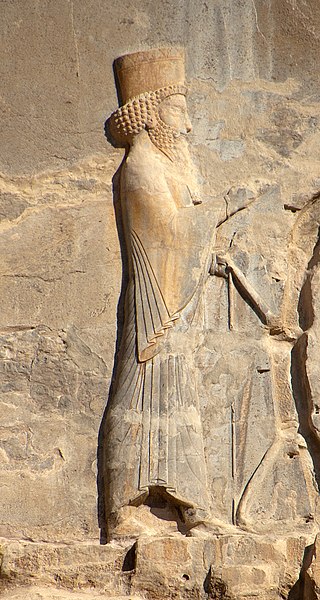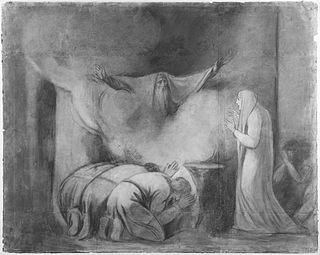
The Battle of Marathon took place in 490 BC during the first Persian invasion of Greece. It was fought between the citizens of Athens, aided by Plataea, and a Persian force commanded by Datis and Artaphernes. The battle was the culmination of the first attempt by Persia under King Darius I, to subjugate Greece. The Greek army inflicted a crushing defeat on the more numerous Persians, marking a turning point in the Greco-Persian Wars.

Elizabeth Barrett Browning was an English poet of the Victorian era, popular in Britain and the United States during her lifetime and frequently anthologised after her death. Her work received renewed attention following the feminist scholarship of the 1970s and 1980s, and greater recognition of women writers in English.

Year 490 BC was a year of the pre-Julian Roman calendar. At the time, it was known as the Year of the Consulship of Camerinus and Flavus. The denomination 490 BC for this year has been used since the early medieval period, when the Anno Domini calendar era became the prevalent method in Europe for naming years.

Xerxes I, commonly known as Xerxes the Great, was a Persian ruler who served as the fourth King of Kings of the Achaemenid Empire, reigning from 486 BC until his assassination in 465 BC. He was the son of Darius the Great and Atossa, a daughter of Cyrus the Great. In Western history, Xerxes is best known for his invasion of Greece in 480 BC, which ended in Persian defeat. Xerxes was designated successor by Darius over his elder brother Artobazan and inherited a large, multi-ethnic empire upon his father's death. He consolidated his power by crushing revolts in Egypt and Babylon, and renewed his father's campaign to subjugate Greece and punish Athens and its allies for their interference in the Ionian Revolt. In 480 BC, Xerxes personally led a large army and crossed the Hellespont into Europe. He achieved victories at Thermopylae and Artemisium before capturing and razing Athens. His forces gained control of mainland Greece north of the Isthmus of Corinth until their defeat at the Battle of Salamis. Fearing that the Greeks might trap him in Europe, Xerxes retreated with the greater part of his army back to Asia, leaving behind Mardonius to continue his campaign. Mardonius was defeated at Plataea the following year, effectively ending the Persian invasion.
This article concerns the period 499 BC – 490 BC.

Marathon is a town in Greece and the site of the Battle of Marathon in 490 BCE, in which the heavily outnumbered Athenian army defeated the Persians. Legend has it that Pheidippides, a Greek herald at the battle, was sent running from Marathon to Athens to announce the victory, which is how the marathon running race was conceived in modern times. Today it is part of East Attica regional unit, in the outskirts of Athens and a popular resort town and center of agriculture.

Arses, known by his regnal name Artaxerxes II, was King of Kings of the Achaemenid Empire from 405/4 BC to 358 BC. He was the son and successor of Darius II and his mother was Parysatis.

Pheidippides or Philippides (Φιλιππίδης) is the central figure in the story that inspired two modern sporting events, the marathon race and the Spartathlon. Pheidippides is said to have run from Marathon to Athens to deliver news of the victory of the battle of Marathon.

The Battle of Mycale was one of the two major battles that ended the second Persian invasion of Greece during the Greco-Persian Wars. It took place on or about August 27, 479 BC on the slopes of Mount Mycale, on the coast of Ionia, opposite the island of Samos. The battle was fought between an alliance of the Greek city-states, including Sparta, Athens and Corinth, and the Persian Empire of Xerxes I.

The Persians is an ancient Greek tragedy written during the Classical period of Ancient Greece by the Greek tragedian Aeschylus. It is the second and only surviving part of a now otherwise lost trilogy that won the first prize at the dramatic competitions in Athens' City Dionysia festival in 472 BC, with Pericles serving as choregos.

The Greco-Persian Wars were a series of conflicts between the Achaemenid Empire and Greek city-states that started in 499 BC and lasted until 449 BC. The collision between the fractious political world of the Greeks and the enormous empire of the Persians began when Cyrus the Great conquered the Greek-inhabited region of Ionia in 547 BC. Struggling to control the independent-minded cities of Ionia, the Persians appointed tyrants to rule each of them. This would prove to be the source of much trouble for the Greeks and Persians alike.

The Battle of Plataea was the final land battle during the second Persian invasion of Greece. It took place in 479 BC near the city of Plataea in Boeotia, and was fought between an alliance of the Greek city-states, and the Persian Empire of Xerxes I.
Mardonius was a Persian military commander during the Greco-Persian Wars. Though he secured initial victories in the first Persian invasion of Greece, he was ultimately forced to retreat into Anatolia after suffering catastrophic losses in both men and material due to a storm off the coast of Mount Athos, following which he was relieved of his command by Darius the Great. He was later re-appointed by Xerxes I and took part in the second Persian invasion of Greece. In 480 and 479 BC, Mardonius spearheaded the Persian army's destruction of Athens. Shortly thereafter, he was killed during the Battle of Plataea.

Hippias was the last tyrant of Athens, ruling from 527 to 510 BC. He was one of the Peisistratids, a group of three tyrants in Ancient Greece. Pisistratus first, and then his son, Hippias, followed after him by Hippias' illegitimate son, Hegesistratos. He was deposed when Cleomenes I of Sparta successfully invaded Athens and forced him to flee to Persia.

Warfare occurred throughout the history of Ancient Greece, from the Greek Dark Ages onward. The Greek 'Dark Ages' drew to an end as a significant increase in population allowed urbanized culture to be restored, which led to the rise of the city-states (Poleis). These developments ushered in the period of Archaic Greece. They also restored the capability of organized warfare between these Poleis. The fractious nature of Ancient Greek society seems to have made continuous conflict on this larger scale inevitable.

Miltiades, also known as Miltiades the Younger, was a Greek Athenian citizen known mostly for his role in the Battle of Marathon, as well as for his downfall afterwards. He was the son of Cimon Coalemos, a renowned Olympic chariot-racer, and the father of Cimon, the noted Athenian statesman.

The siege of Eretria took place in 490 BC, during the first Persian invasion of Greece. The city of Eretria, on Euboea, was besieged by a strong Persian force under the command of Datis and Artaphernes.

The Battle of the Eurymedon was a double battle, taking place both on water and land, between the Delian League of Athens and her Allies, and the Persian Empire of Xerxes I. It took place in either 469 or 466 BCE, in the vicinity of the mouth of the Eurymedon River in Pamphylia, Asia Minor. It forms part of the Wars of the Delian League, itself part of the larger Greco-Persian Wars.

The first Persian invasion of Greece, during the Greco-Persian Wars, began in 492 BC, and ended with the decisive Athenian victory at the Battle of Marathon in 490 BC. The invasion, consisting of two distinct campaigns, was ordered by the Persian king Darius the Great primarily in order to punish the city-states of Athens and Eretria. These cities had supported the cities of Ionia during their revolt against Persian rule, thus incurring the wrath of Darius. Darius also saw the opportunity to extend his empire into Europe, and to secure its western frontier.

The second Persian invasion of Greece occurred during the Greco-Persian Wars, as King Xerxes I of Persia sought to conquer all of Greece. The invasion was a direct, if delayed, response to the defeat of the first Persian invasion of Greece at the Battle of Marathon, which ended Darius I's attempts to subjugate Greece. After Darius's death, his son Xerxes spent several years planning for the second invasion, mustering an enormous army and navy. The Athenians and Spartans led the Greek resistance. About a tenth of the Greek city-states joined the 'Allied' effort; most remained neutral or submitted to Xerxes.
















